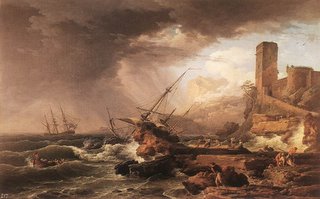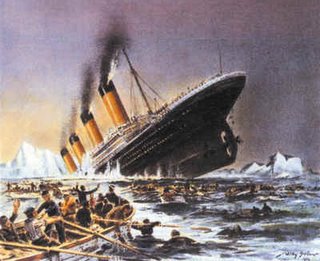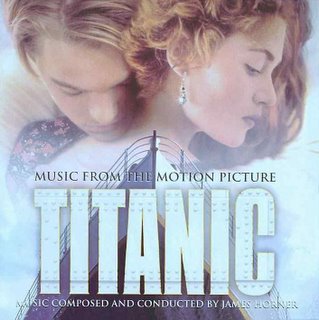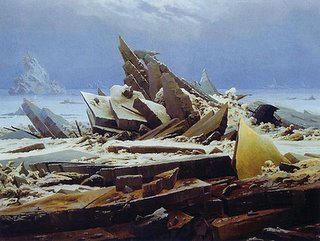
The opening stanza of Hopkins' great poem's second part is about Death.
Death. A painful, ugly topic--yet a fact, a universal fact for every one of us.
This stanza, stanza 11, is a meditation on Death--putting the entire poem in the context of Death. "Dust!" is our universal, common destiny. Death is a real thing--metaphysical debates aside. Perhaps this is why tales of shipwreck are so effectively romantic--because a tale of a shipwreck mythologizes our common fate. We are all on the
Titanic, all on the
Deutschland.
Hopkins has Death speak and use the many names, many experiences, by which people encounter Death--sword, flange, rail, flame, fang, flood. But the image of the shipwreck is a powerful poetic image that puts us all on the deck of Death.

Perhaps that is why the greatest cheezey movie of all time--James Cameron's
Titanic--was so powerful a film for so many millions of people. Despite the inelegant dialogue, the tale of Leonardo di Caprio & Kate Winslett on the
Titanic was a kind of romantic universal myth of the situation of everyone--in the face of the fact of Death, the point is how we face it, what we do, how we act, to what and to whom do we give outselves. Some choose to struggle for life against everyone else, some with a few others; some make their art or their music, while some do their duty of rank or office; some kill thmselves in despair, some just get drunk; and some--Jack & Rose in the movie--offer themselves for each other in a self-sacrificial romantic Love that prefigures Christian love and Christ's sacrifice. No wonder Rose uses words like "He saved me."!
In the face of Death, Leo (Jack) & Kate (Rose) live for Love. Their romantic, secular example in
Titanic is a myth for all of us: since we are all on the
Titanic, since we are all, inevitably, ultimately, every one of us, going to die, thus how we face that absolutely real fact is the very existential definition of our lives. In
Titanic, we weep with a grief that is Joy for Leo & Kate, for Jack & Rose, because in the face of Death they live for Love.

And like
Titanic, Hopkins' poem is of the same genre--in the face of Death, a Tall Nun calls out "O Christ, Christ, come quickly!" And like
Titanic, Hopkins' poem, through exploring the most profoundly sad experience, ultimately expresses not only Hope but joyful, glorious Hope! But for that Hope to be truly Hopeful, we must first risk hopelessness in the real fact of Death. "All flesh is grass, and its beauty is the beauty of the flowers: the flowers wither, the grass fades, but the Word of the Lord remains forever!"
Hopkins' second part of the
"Wreck" reminds us that in the midst of life we are on the deck of a sinking ship:
‘Some find me a sword; some
The flange and the rail; flame,
Fang, or flood’ goes Death on drum,
And storms bugle his fame.
But wé dream we are rooted in earth—Dust!
Flesh falls within sight of us, we, though our flower the same,
Wave with the meadow, forget that there must
The sour scythe cringe, and the blear share come.
 This coming New Year's Eve, a fantastic way to celebrate the New Year is the gorgeous Mozart at 250 at St James Cathedral in Seattle.
This coming New Year's Eve, a fantastic way to celebrate the New Year is the gorgeous Mozart at 250 at St James Cathedral in Seattle. 




